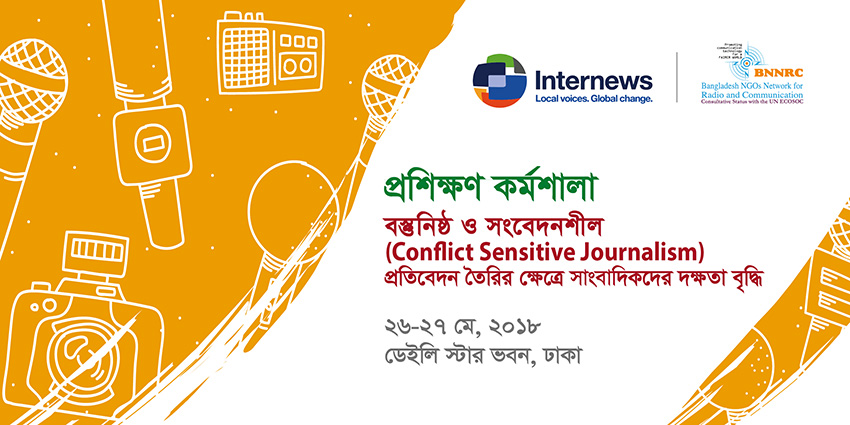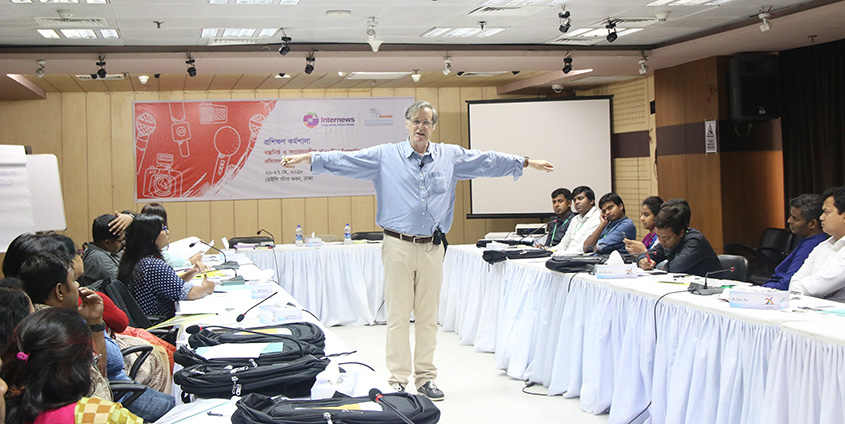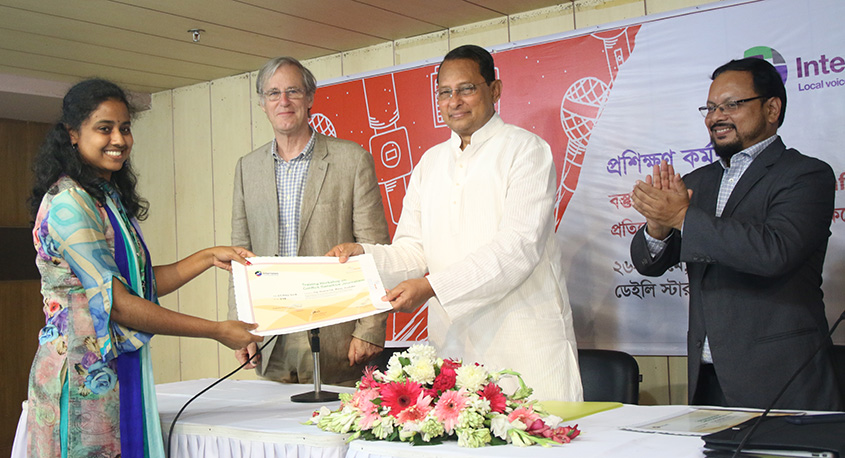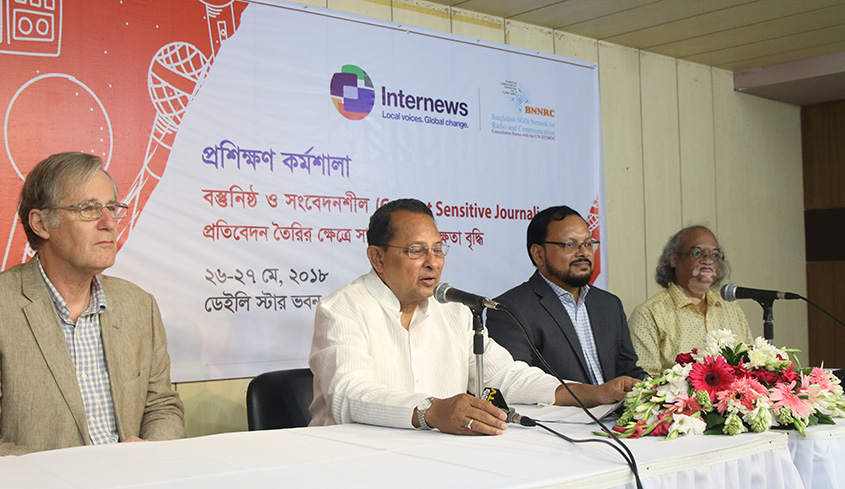26-27 May 2018, Dhaka, Bangladesh
Vanue: The Daily Star Bhaban, Dhaka
Facilitator: Mr. Nicholas Nugent, Consultant in Broadcasting and Journalism, UK
List of Workshop Participants
Program Schedule
| DAY ONE | 26 May 2018 |
|---|---|
| 10:00-10:15am | Registration |
| 10:15-11:00 am | Welcome & Introductions Discussing Newsroom Roles Performed What do you want to achieve from this workshop (listening to the trainees’ learning expectations or objectives)? Who is your audience (Understanding your audience – discussion on readers/listeners feedback)? What does your audience expect from your coverage (dialogue with readers/listeners on social media, maybe call-ins or emails)? Outcome: Determining trainees’ reporting experience and their audience; clarifying workshop objectives; coming back to trainees’ expectations at end of training. |
| 11:00-11:30 am | The Role of the Journalist in Conflict What is the root cause of conflict (how do we Identify and report on conflict already)? What is the CSJ way? (How to report responsibly and use facts not conjecture) Objectivity in reporting – Football analogy. Exercise: Sourcing the news: putting values on sources and attribution. Outcome: Trainees learn about reporting objectively and understand the different types of conflict; Understanding the definition of CSJ (armed conflict, social conflict, economic conflict) and its aftermath |
| 11:30-12:00 pm | Introduction to Conflict-Sensitive Journalism Theories of Conflict Understanding the “Do No Harm” principle and UN humanitarian architecture, cluster groups, etc. Understanding social conflict (Early childhood marriage, human trafficking, Sexual and gender-based violence). The journalist’s role in promoting peace through democratic dialogue Outcome: Understanding theories and principles of CSJ. |
| 12:00-12:15 pm | Networking Break |
| 12:15-12:45pm | Understanding conflict Understanding regional conflict: Bangladesh, Myanmar, Sri Lanka How do these conflicts differ? Are there similarities? Issues of bias or belonging for journalists How to avoid using stereotypes (on race, ethnicity, gender) Outcome: Understanding the necessity to look at motivating factors behind conflict; Knowing who the actors are and the role they can play in resolving it |
| 12:45-1:30 pm | Balanced reporting in practice. How to use neutral vocabulary in journalism (Avoiding the we/they syndrome) Media law and ethical reporting primer Outcome: Understanding objectivity, neutral language and ethical reporting as the key to CSJ Assignment 1: Types of Conflict (participants jot down conflict they’ve witnessed) |
| 1:30-2:00 pm | Networking Break |
| 2:00-3:00 pm | Reporting conflict: First hand experiences The Rohingya Experience in Bangladesh The liberation of Bangladesh from Pakistan mirrors some of what Rohingya face/faced with Myanmar How to improve reporting on host community. What kind of stories can improve host and refugee community relations? (Creating a sense of community) Outcome: Understanding the context and conditions under which the Rohingya sheltered in Bangladesh Dealing with one’s own prejudice, and examining how principles of CSJ can be applied Building peace, improving refugee-host community relations through news reporting Assignment 2: Analyze news reports (participants discuss selected news reports from local and international media) |
| 3:00-3:15 pm | Networking Break |
| 3:15-3:30 pm | Reflection on the Basics of Conflict Sensitive Journalism Learning points Assignment 3 (Overnight): Participants should re-discuss the ethical and technical challenges of interviewing victims and perpetrators. Outcome: Preparation for Day 2; anticipating challenges |
| DAY TWO | 27 May 2018 |
|---|---|
| 10:00-11:00 am | Interview techniques: Participants interview and present each other to group How to ask better questions in an interview (open ended vs close ended; avoid double barreled questions, listening attentively and asking good follow up questions) How to approach an interview subject sensitively (not being aggressive, asking questions nicely, not being too pushy) Outcome: Assessing trainee interview techniques and challenges |
| 11:00-11:45 am | Can you remain true to your beliefs and continue to report impartially? A case study from (Northern Ireland) with journalistic lessons Exercise: Participants list factors they think might influence their reporting |
| 11:45-12:15 pm | Analyze news reports from Overnight Assignment Participants discuss selected news reports from local and international media Outcome: Participants have a better understanding of the common mistakes in reporting conflict – avoiding bias, stigma and dehumanization |
| 12:15-1:00 pm | Truth, the first casualty |
| 1:00-1:30 pm | Networking Break |
| 1:30-2:15 pm | Reporting conflict: Safety in the field Safety for journalists reporting violent conflict (with videos), followed by an exercise in preparing to report conflict. |
| 2:15-3:00 pm | Pulling it all together What lessons have you learned about understanding and reporting conflict, overcoming biases and using neutral language? Again, what is the CSJ way? How will this training improve your future reporting/journalism? Outcome: Discuss potential story ideas. Participants can take these ideas back to respective newsrooms and prove to senior editors or producers how CSJ is needed and very important in news coverage |
| 3:00-3:30 pm | Closing: Remarks by Chief Guest, Special Guest, Distribution of Certificates |
Picture of Workshop:
Mr. Nicholas Nugent, Consultant in Broadcasting and Journalism, UK is facilitating one of the sessions of the workshop.
Hasanul Huq Inu, Informaton Minister handing over certificate to one of the 27 participants who completed the workshop. Also seen are Zain Al Mahmood, Country Director of Internews and Nicholas Nugent.
Hasanul Huq Inu, Minister of Information speaks as the Chief Guest on the concluding day of the workshop. Also seen are Mr AHM Bazlur Rahman, CEO of BNNRC (far right) and Zain Al Mahmood, Country Director of Internews Network.




